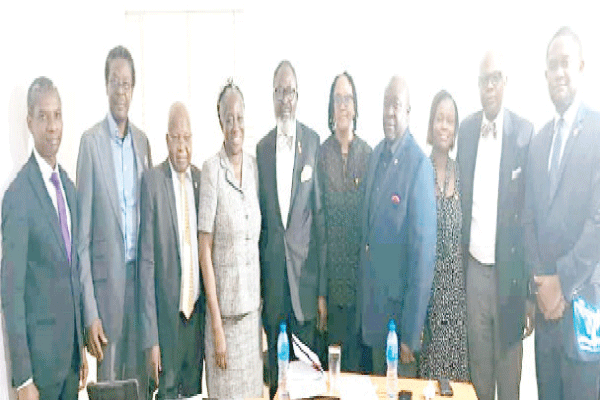Environmental law experts have called for urgent prioritisation of fundamental human rights in the design, negotiation, planning and implementation of land-based investments in order to address adverse economic, social and environmental impacts to local communities that depend on is traditional lands and forests for their lives and livelihoods.
The recommendation was made at a public lecture to commemorate this year’s World Environment Day with the theme “Human and Environmental Rights at risk under Land-Based Investments in Emerging Markets.”
The event which was organised by the Business and Human Committee of the International Law Association (ILA), (Nigerian branch) was chaired by Dr. Oyeniyi Abe, and held in partnership with the Institute for Oil, Gas, Energy, Environment and Sustainable Development (OGEES Institute), Afe Babalola University Ado Ekiti (ABUAD), Nigerian Institute of Advanced Legal Studies, and the University of Bradford, United Kingdom.
Legal Counsel to the African Union, Prof. Hajer Gueldich, in a keynote address, urged stakeholders in business and investment in Nigeria and across Africa, to actively mainstream responsible and human-rights based approach to investment in line with the United Nations Guiding Principles on Business and Human Rights.
Prof. Gueldich, who is also a Professor of Law at the University of Carthage, Tunisia, and a former Chairperson of the African Union Commission on International Law (AUCIL) emphasized the need for transparent environment impact assessments (EIAs), human rights impact assessments, and free prior informed consent of landowners and communities as crucial pillars for anticipating and addressing human rights risks.
In his opening message, WCEL member and the President of the ILA (Nigerian Branch), Prof. Damilola S. Olawuyi, (SAN) who said “land is life” noted that in many economic sectors, especially in fast-moving consumer goods, extractives, and agribusiness sectors, land-based investments remain associated with human rights concerns including land grabbing, lack of adequate compensation, and forced displacement of impacted communities.
Prof. Olawuyi, who is also an Independent Expert of the United Nations Working Group on Business and Human Rights remarked that this year’s World Environment Day is a timely reminder for all business enterprises, governments and other stakeholders to ensure a renewed commitment to the UN Guiding Principles on Business and Human Rights and other international human rights instruments in all spheres of their operations.
Prof. Olawuyi congratulated the ILA Nigeria BHR Committee for bringing them together to discuss this timely and topical issue on this auspicious occasion of the World Environment Day.
The keynote conversation was followed by a high-level panel discussions which featured eminent experts including a former Vice Chancellor of the Lagos State University (LASU), Prof. Lanre Fagbohun, (SAN), an indigenous activist from the Cordillera, Philippines, Joan Carling, an Associate Professor of the School of Law, University of Bradford, Dr. Pedi Obani and a member of the BHR Committee, Nabila Gaduya.
The speakers, in their different submissions, noted the urgent need to deepen human rights education, gender responsive local capacity building and employment, enhance availability of meaningful remedies and foster transparent monitoring and evaluation of compliance by corporate actors to effectively break the vicious cycle of significant environmental harm and human rights violations linked to land-based investments.
On his part, the Chairperson of the BHR Committee, Dr. Oyeniyi Abe, a leading business and human rights expert in Africa, charged governments at all levels, and the various stakeholders to, not only ensure corporate responsibility and accountability in the context of large-scale land investments, but to also deepen capacity development and education on business and human rights through continued collaboration and partnerships in line with the United Nations SDG.
He noted that the ILA BHR Committee remains ready to support such training and capacity development efforts on corporate responsibility and BHR.
ALSO READ: June 12 Protest: Lagos CP, Fayoade, assures zero tolerance for lawlessness
WATCH TOP VIDEOS FROM NIGERIAN TRIBUNE TV
- Let’s Talk About SELF-AWARENESS
- Is Your Confidence Mistaken for Pride? Let’s talk about it
- Is Etiquette About Perfection…Or Just Not Being Rude?
- Top Psychologist Reveal 3 Signs You’re Struggling With Imposter Syndrome
- Do You Pick Up Work-Related Calls at Midnight or Never? Let’s Talk About Boundaries






